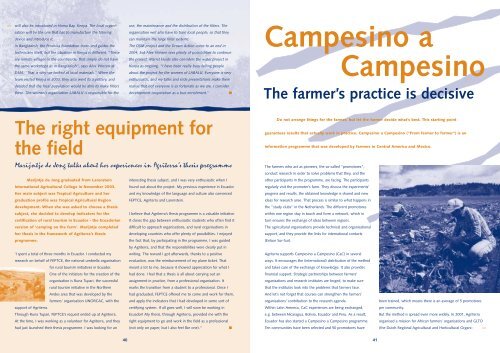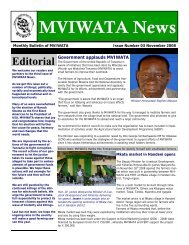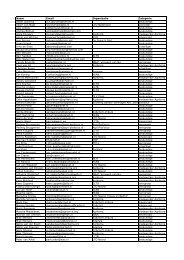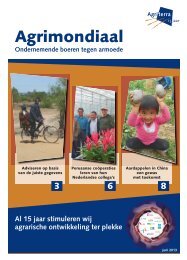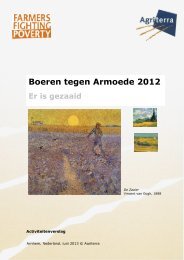télécharger - Agriterra
télécharger - Agriterra
télécharger - Agriterra
Create successful ePaper yourself
Turn your PDF publications into a flip-book with our unique Google optimized e-Paper software.
will also be introduced in Homa Bay, Kenya. The local organisationwill be the one that has to manufacture the filteringdevice and introduce it.In Bangladesh, the Proshika foundation trains and guides thetechnicians itself, but the situation in Kenya is different. "Theseare remote villages in the countryside, that simply do not havethe same workshops as in Bangladesh", says Alex Vrinzen atDSM. "That is why we looked at local materials." When theteam visited Kenya in 2003, they also went to a pottery, anddecided that the local population would be able to make filtersthere. The women’s organisation LABALU is responsible for theuse, the maintenance and the distribution of the filters. Theorganisation will also have to train local people, so that theycan maintain the large filter systems.The DSM project and the Dream Action come to an end in2004, but Alex Vrinzen sees plenty of possibilities to continuethe project. Mariet Huijts also considers the water project inKenya as ongoing. "I have been really busy telling peopleabout the project for the women of LABALU. Everyone is veryenthusiastic, and my talks and slide presentations make themrealise that not everyone is as fortunate as we are. I considerdevelopment cooperation as a true enrichment."■Campesino aCampesinoThe farmer’s practice is decisiveThe right equipment forthe fieldDo not arrange things for the farmer, but let the farmer decide what’s best. This starting pointguarantees results that actually work in practice. Campesino a Campesino ("From farmer to farmer") is aninformation programme that was developed by farmers in Central America and Mexico.Marijntje de Jong talks about her experiences in <strong>Agriterra</strong>’s thesis programmeMarijntje de Jong graduated from LarensteinInternational Agricultural College in November 2003.Her main subject was Tropical Agriculture and hergraduation profile was Tropical Agricultural Regioninteresting thesis subject, and I was very enthusiastic when Ifound out about the project. My previous experience in Ecuadorand my knowledge of the language and culture also convincedFEPTCE, <strong>Agriterra</strong> and Larenstein.development. When she was asked to choose a thesissubject, she decided to develop indicators for thecertification of rural tourism in Ecuador - the Ecuadorianversion of ‘camping on the farm’. Marijntje completedher thesis in the framework of <strong>Agriterra</strong>’s thesisprogramme.I believe that <strong>Agriterra</strong>’s thesis programme is a valuable initiative.It closes the gap between enthusiastic students who often find itdifficult to approach organisations, and rural organisations indeveloping countries who offer plenty of possibilities. I enjoyedthe fact that, by participating in the programme, I was guidedby <strong>Agriterra</strong>, and that the responsibilities were clearly put in‘I spent a total of three months in Ecuador. I conducted myresearch on behalf of FEPTCE, the national umbrella organisationfor rural tourism initiatives in Ecuador.One of the initiators for the creation of theorganisation is Runa Tupari, the successfulrural tourism initiative in the NorthernAndes area that was developed by thefarmers’ organisation UNORCAC, with thesupport of <strong>Agriterra</strong>.Through Runa Tupari, FEPTCE’s request ended up at <strong>Agriterra</strong>.At the time, I was working as a volunteer for <strong>Agriterra</strong>, and theywriting. The reward I got afterwards, thanks to a positiveevaluation, was the reimbursement of my plane ticket. Thatmeant a lot to me, because it showed appreciation for what Ihad done. I feel that a thesis is all about carrying out anassignment in practice, from a professional organisation. Itmarks the transition from a student to a professional. Once Ihad graduated, FEPTCE offered me to come and work for them,and apply the indicators that I had developed in some sort ofcertifying system. If all goes well, I will soon be working inEcuador! My thesis, through <strong>Agriterra</strong>, provided me with theright equipment to go and work in the field as a professionalhad just launched their thesis programme. I was looking for an (not only on paper, but I also feel like one)."■The farmers who act as pioneers, the so-called "promotores",conduct research in order to solve problems that they, and theother participants in the programme, are facing. The participantsregularly visit the promoter’s farm. They discuss the experiments’progress and results, the obtained knowledge is shared and newideas for research arise. That process is similar to what happens inthe "study clubs" in the Netherlands. The different promotoreswithin one region stay in touch and form a network, which inturn ensures the exchange of ideas between regions.The agricultural organisations provide technical and organisationalsupport, and they provide the links for international contacts(Enlace Sur-Sur).<strong>Agriterra</strong> supports Campesino a Campesino (CaC) in severalways. It encourages the (international) distribution of the methodand takes care of the exchange of knowledge. It also providesfinancial support. Strategic partnerships between farmers’organisations and research institutes are forged, to make surethat the institutes look into the problems that farmers face.And let’s not forget that courses can strengthen the farmers’organisations’ contribution to the research agenda.Within Latin America, CaC experiences are being exchanged,e.g. between Nicaragua, Bolivia, Ecuador and Peru. As a result,Ecuador has also started a Campesino a Campesino programme.Ten communities have been selected and 50 promotores havebeen trained, which means there is an average of 5 promotoresper community.But the method is spread even more widely. In 2001, <strong>Agriterra</strong>organised a mission for African farmers’ organisations and GLTO(the Dutch Regional Agricultural and Horticultural Organi- >>4041


